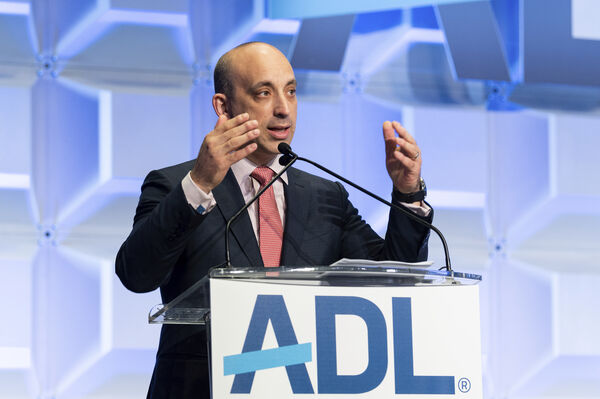Newsletter
Apr
28
2022
April 28th, 2022
Dear Readers,
On Tuesday, as it has since every year 1979, the Anti-Defamation League (ADL) published its annual audit of antisemitic incidents, in which the organization attempts to run the numbers on reported antisemitism in the past year across the US and to discern trends. The main takeaway was grim: the ADL said that this year’s 2,712 incidents marked an all-time high—a 34% rise over last year’s total. CEO Jonathan Greenblatt said in his statement that “we do know that Jews are experiencing more antisemitic incidents than we have in this country in at least 40 years.” But, as I’ve written, antisemitic incidents—and bias-motivated incidents in general—are notoriously challenging to track accurately, and changes in the ADL’s methodology over time can make it hard to compare different years side by side. More numbers could mean that more antisemitic incidents are definitely taking place, or that the ADL has improved and expanded its reporting procedures. When perusing the report, I found myself wondering how much the data can really tell us about long-term trends in antisemitic incidents.
Also this week, the American Jewish Committee (AJC) released the results of a survey of American and Israeli Jewish millennials’ (aged 25-40) opinions on Israel, campus politics, and Israel-diaspora relations. Even as the ADL was raising the alarm about antisemitism, the AJC results suggested that a clear majority of American Jewish millennials is unaffected by or unconcerned with a perceived “anti-Israel climate” on college campuses—this despite all the resources continually poured into fighting campus political battles on Israel, allegedly for the sake of Jewish students. The survey also had some interesting results about American Jewish millennials’ opinions on ideal political outcomes in Israel/Palestine. It found 52.3% of the 800 respondents believe a solution is possible, and of those, 47% support a two-state solution, 22.5% support one binational democatic state, and 15.1% support “Israeli annexation of the West Bank leading to an extension of Israeli sovereignty, but in which Palestinians have a unique civil status and are represented by Palestinian municipal leaders.” (In response, my colleague Peter Beinart tweeted, “I’d love to have been a fly on the wall at the meetings where [the AJC] decided on ‘unique civil status’ as its preferred euphemism for apartheid.”) Jewish Currents has also reported on the challenges of accurately surveying Jewish opinion on Israel and Zionism, since decisions about question wording can make a big difference in results.
When I have questions about data and survey methodology, I usually look to Matthew Boxer, a sociologist at Brandeis University with expertise in Jewish communal research. For this week’s newsletter, Boxer and I talked about the ADL antisemitism audit and the AJC survey, including the challenges and limits of trying to measure a rise in antisemitic incidents and what best practices might be for asking about Israel/Palestine on surveys.
Best,
Mari Cohen
Assistant Editor
P.S. Today I published a deep dive on Deborah Lipstadt, the new US special envoy to monitor and combat antisemitism. I explored whether her historical analysis leaves her equipped to accurately assess or address the threat of antisemitism. Be sure to check it out!

Anti-Defamation League CEO Jonathan Greenblatt speaking at the ADL National Leadership Summit in Washington, DC on June 4th, 2019.
Matthew Boxer: I should preface this by saying I think the ADL is an indispensable organization, and I’m not saying what they’ve done here is without value. But the reality is that their methodology excludes a lot of different kinds of incidents. They don’t count instances of discrimination like not being given accommodation to take off for Jewish holidays, unless it’s accompanied by harassment. They don’t include general expressions of bigotry unless they’re overtly antisemitic. They’d count someone saying “Jews will not replace us,” but not necessarily someone blaming everything on George Soros or Michael Bloomberg. They’re counting particular types of incidents that appear on their radar. For example, I tweeted about my public high school where at one point I was the only publicly identified Jew. It was not unusual for me to hear accusations that I personally nailed Jesus to the cross. That’s an antisemitic incident. How was the ADL ever going to hear about that unless I reported it? Things like that happen all the time all over the country. A couple of years ago, in one of their annual surveys of American Jewish opinion, the AJC found that around three-quarters of Jews who said they had experienced an antisemitic incident never reported it at any level. Most incidents don’t get reported anywhere, let alone to the ADL, and some of the incidents that might get reported aren’t necessarily being counted.
So this audit doesn’t necessarily mean that antisemitic incidents have increased since last year. It might mean that people did a better job of recording incidents this year, or that more incidents were sufficiently notorious and got enough press attention to appear on the ADL’s radar. There are a lot of reasons why those numbers might fluctuate that have nothing to do with increasing or decreasing antisemitism. An audit like this is never a good way to judge whether antisemitism is increasing or decreasing. The numbers might have increased because antisemites are bolder than they used to be. When the president of the United States talks about Nazis as “very fine people,” they’re suddenly less afraid of exposing what garbage human beings they are for all the world to see.
MC: So you’re saying the level of antisemitism remains the same, but the number of incidents might rise, if antisemites are more emboldened?
MB: They might be committing more incidents, or the incidents might be getting more severe. Either way, the same baseline level of antisemitism could become more of a problem. We live in such a polarized society that any little thing can turn into an incident. People are more reactive and likely to lash out than they were in the past, and in ways that are likelier to draw attention. To the ADL’s credit, they spell out their methodology and their documentation, so anyone reading it carefully should be able to come to the same conclusion that I do: This is not reflective of every incident, but it’s not supposed to be.
MC: But that seems to conflict with some of the marketing, and with Greenblatt’s statement that the audit shows antisemitism is at its highest level in 40 years.
MB: I think he’s trying to make it easier for people to understand. He might even believe that is 100% accurate; I’ve never spoken to him. I’m just saying it’s not that simple. We do these representative sample surveys of American Jewish communities, and one of the questions we commonly ask is whether respondents personally experienced antisemitism at any point in the past year. Based on the number of people who say yes, there are more incidents in some individual communities than the ADL reported nationally in any given year. For instance, just in Orlando and Kansas City, which between them have around 75,000 Jews, there were more incidents than the ADL reported in the audit for the entire country.

NEXT TUESDAY, May 3rd, 7-10 pm Eastern:
We’ve missed you! Come celebrate the release of our Winter/Spring 2022 double-issue dedicated to Soviet Jewry! Mingle with fellow Jewish Currents lovers outdoors in the backyard at Union Pool in Williamsburg, Brooklyn.
Let us know if you’re planning to come by registering here.
Union Pool is a fully handicap accessible venue. Vaccination against Covid-19 and testing beforehand are strongly encouraged. If you have accommodation requests or questions about accessibility, please reach out to events@jewishcurrents.org.